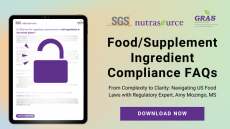WATCH: Hemp-derived CBD... navigating the regulatory minefield
To learn more, FoodNavigator-USA caught up with PSL Law Group partner Jeni Lamb Rogers at the Specialty Food Association’s Winter Fancy Food Show to ask the following questions:
- The FDA says CBD is not a legal dietary ingredient because it was first investigated as a drug. Some manufacturers say this exclusionary clause only applies to the isolated CBD that was used in the drug trials, and that this doesn’t apply to broad or full spectrum hemp extracts. Is this a sound legal argument?
- Some people say the cutoff between foods/supplements and drugs should be based on dosage (high doses belong in drugs, low doses in foods/supplements). Others say the distinction should be between hemp extracts and isolates. Where might the FDA draw a line?
- So far the FDA has limited enforcement activity to brands making egregious claims, but class action lawsuits have targeted market leaders such as CV Sciences and Charlotte’s Web, which don’t make irresponsible claims, so does this undermine the argument that brands are safe to market CBD-infused products as long as they don’t claim it can cure cancer?
- A bill was just introduced in the US House of Representatives that would update the exclusionary clause to allow for CBD products. Is this a good solution?
- Some retailers are stocking CBD supplements but not foods & beverages. Given the FDA says CBD is not a legal ingredient in foods OR supplements, does this strategy make sense?
- Some brands have been hit with lawsuits arguing that their products are misbranded because CBD is not a legal dietary ingredient. What defense strategies could they deploy?
- While the FDA says CBD isn’t legal in ingestibles, several states have explicitly authorized the sale of hemp-derived CBD products. So where does this leave brands?
Watch our video to find out what Jeni Lamb Rogers had to say…





















